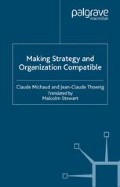Abstract
There is a viable response to the increasing hybridization and complexity that the conduct of firms is subjected to. It is cognitive. The more the firm resorts to organizational models that encourage the emergence of cognitive conventions between its staff and its operations, which enrich rather than impoverish its cognitive system, the more continuity is assured between its strategic positioning and its methods of operation and between its external ambitions and its internal organization.
Access this chapter
Tax calculation will be finalised at checkout
Purchases are for personal use only
Preview
Unable to display preview. Download preview PDF.
Copyright information
© 2003 Village Mondial/Pearson Education, Paris
About this chapter
Cite this chapter
Michaud, C., Thoenig, JC. (2003). The Organizational System. In: Making Strategy and Organization Compatible. Palgrave Macmillan, London. https://doi.org/10.1057/9780230512085_3
Download citation
DOI: https://doi.org/10.1057/9780230512085_3
Publisher Name: Palgrave Macmillan, London
Print ISBN: 978-1-349-51056-6
Online ISBN: 978-0-230-51208-5
eBook Packages: Palgrave Business & Management CollectionBusiness and Management (R0)

